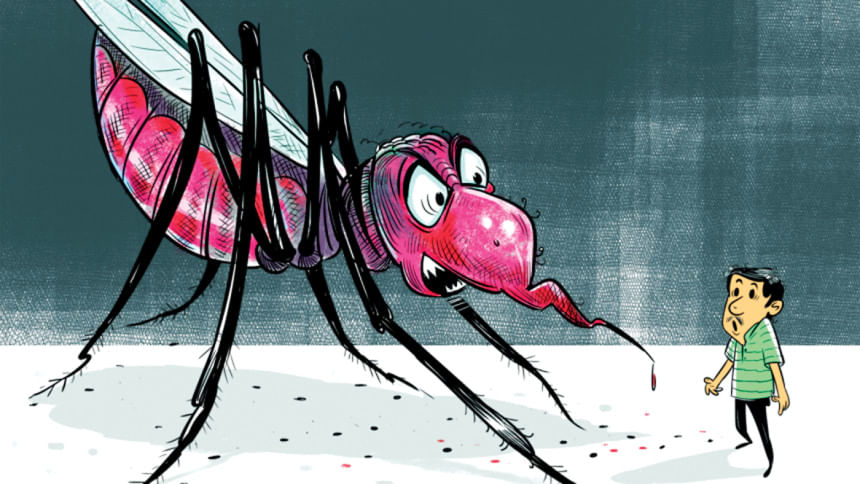Dengue Surge: Mitford hospital stretched to the limit

It was around 1:00pm on Thursday when this correspondent entered one of the medicine wards at Mitford hospital in Old Dhaka. Just at the entrance, two women were found wailing -- they had just lost a loved one to dengue.The body of Ibrahim, 50, lay on a bed placed on the floor. His daughter-in-law Rachona Akhtar sat silently beside him, her eyes swollen with tears, while her husband and relatives completed the formalities to take the body home to Keraniganj for burial."We never imagined this wou...
It was around 1:00pm on Thursday when this correspondent entered one of the medicine wards at Mitford hospital in Old Dhaka. Just at the entrance, two women were found wailing -- they had just lost a loved one to dengue.
The body of Ibrahim, 50, lay on a bed placed on the floor. His daughter-in-law Rachona Akhtar sat silently beside him, her eyes swollen with tears, while her husband and relatives completed the formalities to take the body home to Keraniganj for burial.
"We never imagined this would happen," Rachona said in a trembling voice. "He had fever for three days, but we thought it was nothing serious. We gave him medicine from a local pharmacy."
Ibrahim, who supported his family by selling pickles, was brought to the hospital on Wednesday night when he began struggling to breathe. Despite being admitted at 9:00pm, he passed away 16 hours later.
"We didn't even know it was dengue until yesterday," Rachona said quietly.
Dr Ripon Biswas, medical officer at Mitford hospital, said Ibrahim arrived in critical condition with septicaemia -- an infection that had spread throughout his body -- along with hepatitis and fluid accumulation in his lungs and abdomen.
"We tried to move him to the ICU," Dr Biswas said, "but there were no available beds. Our ICU has only 10 beds, and they are always full."
Since September, Mitford hospital has been facing overwhelming pressure from dengue patients, many in severe condition. On Wednesday alone, 20 new dengue patients were admitted to a ward designed for just six beds.
"We never turn away a critical patient," Dr Biswas added. "When no beds are available, we treat them on the floor. Our doctors and nurses do their best, even when ICU support is needed but unavailable."
According to the Directorate General of Health Services, at least 259 dengue patients died while 63,170 others were hospitalised as of Thursday. Among the deaths and cases, 1,223 and 15 respectively were reported at Mitford hospital.
During a visit to the ward, this correspondent found several patients lying on mats and beds placed along the floor.
Among them was Yunus Mallik, 85, from the Mitford area, who had been receiving treatment since Wednesday. His grandson, Robiul Islam, said they came to Dhaka from Bagerhat for another medical issue, only for Yunus to be diagnosed with dengue after days of fever.
"Doctors said many dengue patients need ICU care, but there just aren't enough beds," Robiul said.
Another patient, Abdur Rahman from Keraniganj, was admitted the previous day with nausea and fever. "They said it is dengue," he said weakly. "I am lucky to have found a bed."
Dr Md Mofizur Rahman Mollah, assistant director (finance and store) at Mitford hospital, said the facility currently has 10 ICU beds and five paediatric ICU (PICU) beds.
"We are trying to increase the ICU capacity to at least 30 beds," he said.
According to the hospital's internal death review, most fatalities occur due to late hospitalisation and underlying health complications.
"People should get tested early," Dr Mollah advised. "If someone develops a fever, they should take the NS1 test on the first day. After three or four days, the result may turn negative even if the patient has dengue."
HM Nazmul Ahsan, associate professor at Shaheed Suhrawardy Medical College Hospital, noted that four viral infections -- influenza, dengue, chikungunya, and Covid-19 -- are currently circulating simultaneously. This overlap, he said, often causes confusion and delays in seeking treatment.
"Many patients don't recognise warning signs like severe abdominal pain, breathing difficulty, bleeding, extreme fatigue, or a sharp drop in urine output," he said. "By the time they reach hospitals, their condition is already critical."
He also highlighted that delays in referring critically ill patients from district hospitals to Dhaka are contributing to rising fatalities.
"District-level hospitals must follow national treatment guidelines strictly and treat patients locally whenever possible," he urged.